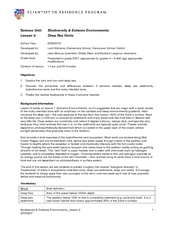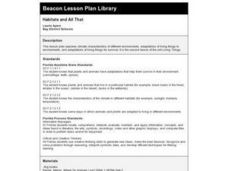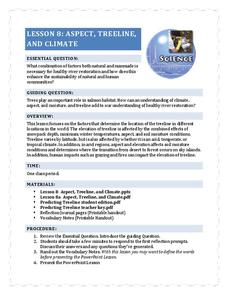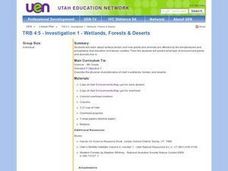Curated OER
Jumanji
Third graders read the book, Jumangi. Then they divide into groups of four or five and choose a habitat - desert, wetlands, Arctic/Antarctic, etc. Then each group can research the habitat to learn what kind of animals live there.
Curated OER
Specialized for the Sea
Students use pictures and make a mural to investigate how ocean animals are adapted to certain parts of their environment.
Curated OER
Deep Sea Vents
Students study the vent and non vent deep sea and see the differences in habitats. In this investigative lesson plan students complete a worksheet and work in groups.
Curated OER
Force of Habitat
Students examine the Nevada state quarter and discuss the Great Basin and the desert habitat. They draw a desert animal and write a sentence about its attributes and how they help the animal to survive in its habitat.
Curated OER
Habitats and All That
First graders read books, complete online explorations and discuss the ways in which animals adapt to their habitats in order to survive. They create accordion books, play matching games and dramatize animal adaptations.
Curated OER
Habitats Black and White Pictures: Farm, Forest, Wetlands, Polar
For this science worksheet, students examine black and white drawings of 4 habitats: farm, forest, wetlands and polar. There are no questions on the page.
Curated OER
Animals Around Us
Young scholars view and discuss a Discovery Channel video that compares the animals found in four different habitats. They compare and contrast the characteristics of forests, deserts, wetlands and grasslands then choose one to depict...
Curated OER
Animals and their Habitats
This animal habitat PowerPoint provides beautiful photographs of a rainforest, desert, and grassland habitat, as well as animals native to a rainforest and the desert. The first slide lists rainforest, desert, tundra, and grassland as...
Curated OER
Don't Call Me A Pig
First graders explore wildlife and habitats in the Arizona desert. Throughout a classroom discussion, 1st graders observe pictures of the desert and animals that live there. As they go on a nature walk around the school, students...
Curated OER
"Habitats"
Students complete a unit of lessons on animals and animal conservation. They observe a square meter of ground outside the school, set up a model environment, analyze an owl pellet, grow bread mold, and explore various websites.
Curated OER
Exploring Habitats
Students analyze the difference between the human habitat and the different habitats of animals in the six lessons of this unit. The students' imaginations and literature are used to explore important aspects of the living environments...
National Park Service
Aspect, Treeline, and Climate
Head to the treeline and beyond to examine how this feature of the landscape affects weather and climate, which gives scientists clues about its health. Class members' observations of photographs provide the data...
Curated OER
Timeline for Bird and Plant Research
Students research and observe birds and plants in selected habitat areas.
National Park Service
Weather Patterns of the Pacific Ocean
How do oceans affect weather patterns? Learners define vocabulary associated with dew point, topographical lifting, condensation, and formation of clouds and precipitation as they explore the weather in the Pacific Northwest. They also...
Curated OER
Wildlife
The centerpiece of this lesson plan is a predator-prey simulation in which colored paperclips represent different species of animals camouflaged against a colored background. Relevant follow-up questions are provided. The activity is...
Curated OER
Prairie Plant Investigation
Young scholars carefully observe prairie plants and record their observations in a science journal. They examine the root systems of grasses and flowers and surmise how these plants can grow together on the prairie.
Curated OER
What Are Earth's Ecosystems?
In this ecosystems worksheet, students will brainstorm facts that relate to 6 different habitats found on the earth: tundra, taiga, grassland, temperate forest, tropical rain forest, and desert.
Curated OER
Investigation 1 - Wetlands, Forests & Deserts
Fourth graders examine surface terrain and how plants and animals are affected by the temperatures and precipitation that elevation and terrain creates. Then students predict what type of environment plants and animals live in.
Curated OER
Insect Collection
Students investigate about various biological aspects of life, while examining desert insect species. They see the diverse range of species that live in the desert, despite the apparent lack of life in the desert. students tocomprehend...
Curated OER
Turtle Fun Facts
In this turtles worksheet, students read two pages of facts about turtles. Students match four kinds of turtle pictures to their habitats.
Curated OER
Adaptations
Cacti have special adaptations for living in desert heat and dryness. Polar bears have adaptations that allow them to withstand icy conditions. Humans adapt to different conditions by wearing appropriate clothing or building homes...
Curated OER
Habitats Pictures: Farm, Forest, Wetlands, Polar
In this science activity, students examine color pictures of 4 different habitats: farm, forest, wetlands and polar. There are no questions to answer.
Curated OER
Survival of the Spiniest
In this earth science instructional activity, students identify and discover the amazing ways that desert plants adapt to harsh habitats. They use discussion and drawing to explore their existing knowledge about deserts. Then, students...
Curated OER
What's That? A Habitat!
Young scholars identify and define what oceans, deserts, woodlands, and cold places are. Then they identify animals that live in different habitats by playing a hands-on sorting activity. Students also research various web sites as...

























